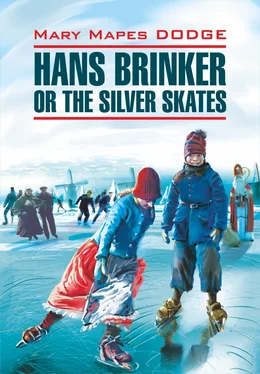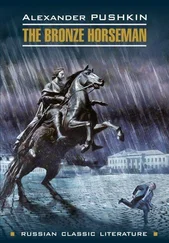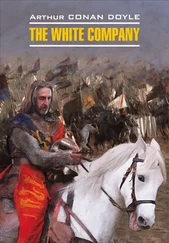Мэри Додж - Hans Brinker, or the Silver Skates / Серебряные коньки. Книга для чтения на английском языке
Здесь есть возможность читать онлайн «Мэри Додж - Hans Brinker, or the Silver Skates / Серебряные коньки. Книга для чтения на английском языке» — ознакомительный отрывок электронной книги совершенно бесплатно, а после прочтения отрывка купить полную версию. В некоторых случаях можно слушать аудио, скачать через торрент в формате fb2 и присутствует краткое содержание. Город: Санкт-Петербург, Год выпуска: 2013, ISBN: 2013, Жанр: foreign_language, literature_19, foreign_prose, на английском языке. Описание произведения, (предисловие) а так же отзывы посетителей доступны на портале библиотеки ЛибКат.
- Название:Hans Brinker, or the Silver Skates / Серебряные коньки. Книга для чтения на английском языке
- Автор:
- Жанр:
- Год:2013
- Город:Санкт-Петербург
- ISBN:978-5-9925-0882-6
- Рейтинг книги:4 / 5. Голосов: 1
-
Избранное:Добавить в избранное
- Отзывы:
-
Ваша оценка:
- 80
- 1
- 2
- 3
- 4
- 5
Hans Brinker, or the Silver Skates / Серебряные коньки. Книга для чтения на английском языке: краткое содержание, описание и аннотация
Предлагаем к чтению аннотацию, описание, краткое содержание или предисловие (зависит от того, что написал сам автор книги «Hans Brinker, or the Silver Skates / Серебряные коньки. Книга для чтения на английском языке»). Если вы не нашли необходимую информацию о книге — напишите в комментариях, мы постараемся отыскать её.
Неадаптированный текст романа снабжен комментариями и словарем. Книга предназначена для студентов языковых вузов и учащихся специализированных школ и гимназий.
Hans Brinker, or the Silver Skates / Серебряные коньки. Книга для чтения на английском языке — читать онлайн ознакомительный отрывок
Ниже представлен текст книги, разбитый по страницам. Система сохранения места последней прочитанной страницы, позволяет с удобством читать онлайн бесплатно книгу «Hans Brinker, or the Silver Skates / Серебряные коньки. Книга для чтения на английском языке», без необходимости каждый раз заново искать на чём Вы остановились. Поставьте закладку, и сможете в любой момент перейти на страницу, на которой закончили чтение.
Интервал:
Закладка:
“One thing is clear,” cries Master Brightside, “the inhabitants need never be thirsty.” But no, Odd-land is true to itself still. Notwithstanding the sea pushing to get in, and the lakes struggling to get out, and the overflowing canals, rivers, and ditches, in many districts there is no water fit to swallow; our poor Hollanders must go dry or drink wine and beer or send far into the inland to Utrecht and other favored localities for that precious fluid older than Adam yet younger than the morning dew. Sometimes, indeed, the inhabitants can swallow a shower when they are provided with any means of catching it; but generally they are like the albatross-haunted sailors in Coleridge’s [18] Coleridge – Сэмюэл Тейлор Колридж (1772–1834), английский поэт-романтик; самое известное его произведение – поэма «Старый мореход»
famous poem The Ancient Mariner . They see
Water, water, everywdere,
Nor any drop to drink!
Great flapping windmills all over the country make it look as if flocks of huge sea birds were just settling upon it. Everywhere one sees the funniest trees, bobbed into fantastical shapes, with their trunks painted a dazzling white, yellow, or red. Horses are often yoked three abreast. Men, women, and children go clattering about in wooden shoes with loose heels; peasant girls who cannot get beaux for love, hire them for money to escort them to the kermis [19] kermis – ( голл. ) ярмарка
, and husbands and wives lovingly harness themselves side by side on the bank of the canal and drag their pakschuyts to market.
Another peculiar feature of Holland is the dune, or sand hill. These are numerous along certain portions of the coast. Before they were sown with coarse reed grass and other plants, to hold them down, they used to send great storms of sand over the inland. So, to add to the oddities, the farmers sometimes dig down under the surface to find their soil, and on windy days DRY SHOWERS (of sand) often fall upon fields that have grown wet under a week of sunshine.
In short, almost the only familiar thing we Yankees can meet with in Holland is a harvest song which is quite popular there, though no linguist could translate it. Even then we must shut our eyes and listen only to the tune, which I leave you to guess.
Yanker didee dudel down
Didee dudel lawnter;
Yankee viver, voover, vown,
Botermelk and Tawnter!
On the other hand, many of the oddities of Holland serve only to prove the thrift and perseverance [20] serve only to prove the thrift and perseverance – ( разг. ) служат доказательством бережливости и трудолюбия
of the people. There is not a richer or more carefully tilled garden spot in the whole world than this leaky, springy little country. There is not a braver, more heroic race than its quite, passive-looking inhabitants. Few nations have equalled it in important discoveries and inventions; none has excelled it in commerce, navigation, learning, and science – or set as noble examples in the promotion of education and public charities; and none in proportion to its extent has expended more money or labor upon public works.
Holland has its shining annals of noble and illustrious men and women; its grand, historic records of patience, resistance, and victory; its religious freedom; its enlightened enterprise; its art, music, and literature. It has truly been called “the battlefield of Europe”; as truly may we consider it the asylum of the world [21] the asylum of the world – ( зд. ) убежище, прибежище для всего мира
, for the oppressed of every nation have there found shelter and encouragement. If we Americans, who after all are homeopathic preparations of Holland stock, can laugh at the Dutch, and call them human beavers and hint that their country may float off any day at high tide, we can also feel proud, and say they have proved themselves heroes and that their country will not float off while there is a Dutchman left to grapple it.
There are said to be at least ninety-nine hundred large windmills in Holland, with sails ranging from eighty to one hundred and twenty feet long. They are employed in sawing timber, beating hemp, grinding, and many other kinds of work; but their principal use is for pumping water from the lowlands into the canals, and for guarding against the inland freshets that so often deluge the country. Their yearly cost is said to be nearly ten million dollars. The large ones are of great power. The huge circular tower, rising sometimes from the midst of factory buildings, is surmounted with a smaller one tapering into a caplike roof. This upper tower is encircled at its base with a balcony, high above which juts the axis turned by its four prodigious ladder-back sails.
Many of the windmills are primitive affairs, seeming sadly in need of Yankee “improvements,” but some of the new ones are admirable. They are constructed so that by some ingenious contrivance they present their fans, or wings, to the wind in precisely the right direction to work with the requisite power. In other words, the miller may take a nap and feel quite sure that his mill will study the wind and make the most of it, until he wakens. Should there be but a slight current of air, every sail will spread itself to catch the faintest breath, but if a heavy “blow” should come, they will shrink at its touch, like great mimosa leaves, and only give it half a chance to move them.
One of the old prisons of Amsterdam, called the Rasphouse [22] Rasphouse – ( голл. ) Скоблильня
, because the thieves and vagrants who were confined there were employed in rasping logwood, had a cell for the punishment of lazy prisoners. In one corner of this cell was a pump, and in another, an opening through which a steady stream of water was admitted. The prisoner could take his choice, either to stand still and be drowned or to work for dear life at the pump [23] to work for dear life at the pump – ( разг. ) качать насос изо всех сил ради спасения жизни
and keep the flood down until his jailer chose to relieve him. Now it seems to me that, throughout Holland, nature has introduced this little diversion on a grand scale [24] on a grand scale – ( разг. ) в большом масштабе
. The Dutch have always been forced to pump for their very existence and probably must continue to do so to the end of time.
Every year millions of dollars are spent in repairing dikes and regulating water levels. If these important duties were neglected, the country would be uninhabitable. Already dreadful consequences, as I have said, have followed the bursting of these dikes. Hundreds of villages and towns have from time to time been buried beneath the rush of waters, and nearly a million persons have been destroyed. One of the most fearful inundations ever known occurred in the autumn of the year 1570. Twenty-eight terrible floods had before that time overwhelmed portions of Holland, but this was the most terrible of all. The unhappy country had long been suffering under Spanish tyranny; now, it seemed, the crowning point was given to its troubles. When we read Motley’s [25] Motley – Джон Литроп Мотли (1814–1877), американский историк, дипломат
history of the rise of the Dutch republic, we learn to revere the brave people who have endured, suffered, and dared so much.
Mr. Motley, in his thrilling account of the great inundation, tells us how a long-continued and violent gale had been sweeping the Atlantic waters into the North Sea, piling them against the coasts of the Dutch provinces; how the dikes, taxed beyond their strength, burst in all directions; how even the Hand-bos, a bulwark formed of oaken piles, braced with iron, moored with heavy anchors, and secured by gravel and granite, was snapped to pieces like thread; how fishing boats and bulky vessels floating up into the country became entangled among the trees or beat in the roofs and walls of dwellings, and how, at last, all Friesland [26] Friesland – Фрисландия, провинция в северной части Голландии
was converted into an angry sea. “Multitudes of men, women, children, of horses, oxen, sheep, and every domestic animal, were struggling in the waves in every direction. Every boat and every article which could serve as a boat was eagerly seized upon. Every house was inundated; even the graveyards gave up their dead. The living infant in his cradle and the long-buried corpse in his coffin floated side by side. The ancient flood seemed about to be renewed. Everywhere, upon the tops of trees, upon the steeples of churches, human beings were clustered, praying to God for mercy and to their fellow men for assistance. As the storm at last was subsiding, boats began to ply in every direction, saving those who were struggling in the water, picking fugitives from roofs and treetops, and collecting the bodies of those already drowned.” No less than one hundred thousand human beings had perished in a few hours. Thousands upon thousands of dumb creatures lay dead upon the waters, and the damage to property was beyond calculation.
Интервал:
Закладка:
Похожие книги на «Hans Brinker, or the Silver Skates / Серебряные коньки. Книга для чтения на английском языке»
Представляем Вашему вниманию похожие книги на «Hans Brinker, or the Silver Skates / Серебряные коньки. Книга для чтения на английском языке» списком для выбора. Мы отобрали схожую по названию и смыслу литературу в надежде предоставить читателям больше вариантов отыскать новые, интересные, ещё непрочитанные произведения.
Обсуждение, отзывы о книге «Hans Brinker, or the Silver Skates / Серебряные коньки. Книга для чтения на английском языке» и просто собственные мнения читателей. Оставьте ваши комментарии, напишите, что Вы думаете о произведении, его смысле или главных героях. Укажите что конкретно понравилось, а что нет, и почему Вы так считаете.












